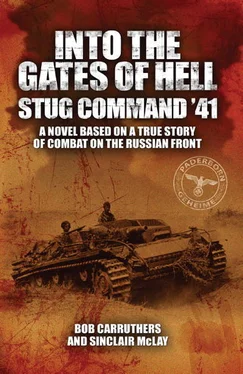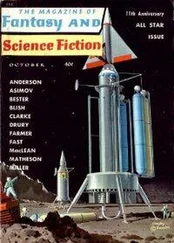“The troops must realise firstly that, in this fight, it is wrong to trust such elements with clemency and consideration in accordance with international law. They are a menace to our own safety and to the rapid pacification of the conquered territories. Secondly, they must realise that the originators of the Asiatic barbaric methods of fighting are the political commissars. They must be dealt with promptly and with the utmost severity. Therefore, if taken while fighting or offering resistance, they must, on principle, be shot immediately.”
“The Führer would never issue an order like that. Show me a copy or, by God, Dirlewanger, I will shoot!”
“Hauptsturmführer, I would not do that if I were you.”
The words were softly spoken and came from behind him. Turning slowly, he could make out the elaborate uniform of an SS-Obergruppenführer. It was none other than Heydrich himself. And behind Heydrich, flanked by a bevy of staff officers and hangers-on, stood Reichsführer Heinrich Himmler.
“Obersturmführer Dirlewanger is correct in his assertion. Your misgivings are understandable, Hauptsturmführer. There were no circulated copies of that order. Warlimont himself limited its circulation. Written copies went to commanders in chief of armies or of air commands, respectively, with an instruction to inform the junior commanders by word of mouth,” said the Reichsführer with complete composure. “But please trust me on this matter. This order, I can assure you, does come directly from the Führer himself. It is his will. He has a grasp, a clearer vision than any of us… And I am sure that you would agree that, if we cannot trust in this broader grasp, this forensic vision… then we are failing in our duties as Germans and as soldiers of the Reich. It is not our job to question the mind of the Führer◦— how futile would that be! It is our job to unswervingly follow his wishes. Do I make myself clear?”
“Yes, Reichsführer,” replied Hans von Schroif, a momentary delay betraying a less than enthusiastic assent.
“Good,” replied Himmler. “I believe our work here is almost done. It has perhaps taken longer than we expected, but I am sure you will agree that, in the final analysis, we did prevail. Now, please return to the assembly point with your unit and prepare for the next stage in this glorious advance. Dismissed.”
Hans von Schroif saluted, turned, and left.
Once out of earshot, Himmler turned to Dirlewanger.
“Now, Obersturmführer Dirlewanger,” he said, motioning to the broken and still groaning halfconscious figure of Yefim Fomin, “please continue with your work.”
* * * * *
Half a mile away, Pyotr Gavrilov, acutely aware of the encroaching enemy troops, drew a deep breath and continued with his final report. He sensed that this was now a balancing act with time, but he was determined that the full story be told. Again Gavrilov paused, but drew enough breath to continue the grisly roll call of the honoured and the dead.
“Thirst. Thirst and hunger. Not only were the fortress defenders threatened by the numerically superior enemy, but soon they also began to run out of food, because many of the food supply depots had been either destroyed or burnt. They collected whatever food and water there was left in the canteens and in the badly damaged warehouses. It was far too little though. Each passing day made their hunger pangs sharper. Medical supplies and bandages also quickly ran out. We sought fresh supplies in damaged warehouses and the dressing stations that were still intact. Undergarments were torn up and used as bandages, but wounds received in fighting were increasingly left un-bandaged.
“The worst hardship borne by the fortress defenders, however, was thirst. The enemy had bombarded the fortress with incendiary bombs, dropped petrol-filled barrels, and used shells that splattered burning liquids when they exploded. Some parts of the fortress were a solid sea of fire. Everything that could burn, did burn. The fires continued unabated in various spots. The hot summer air was even more unbearably hot and, together with the thick smoke and the dust from shattered bricks hanging constantly in clouds over the ruins, it made the people inside the fortress unbearably thirsty. There was no water though, with which to quench their thirst.
“The water tower located above the Terespol gate was destroyed early in the fighting and the water supply system was damaged in many places. There were no emergency reserves of water in the fortress, nor were there any wells inside it. The Mukhavets flowed only a few meters from its walls, but it was impossible to obtain water from it. The enemy installed machine-gunners in the bushes along the riverbanks who opened fire at anyone who tried to reach the river. Anyone who attempted to reach the river by day or night was immediately shot down. There were attempts to dig wells in the casemates, and sheets attached to ropes were thrown into the river then pulled back, and the dirty water was wrung out of them into mess-tins. People even put damp sand into their mouths. None of this, though, could replace a single drop of ordinary water.”
Korsak had by now reluctantly reconciled himself to playing his part in Pyotr Gavrilov’s scheme. He was now dressed as a humble private and he listened intently as Gavrilov moved on to the final part of his report.
“We are nearly there, comrade,” he said to Korsak, “but I would like to finish by singling out the heroic behaviour of two men.”
Korsak nodded in agreement and Gavrilov continued with his despatches.
“Several times during the day of the 23rd of June, Nazi loudspeakers urged the defenders of the fortress to surrender. Enemy artillery ringed the fortress, constantly firing on the citadel, and dive-bombers raided it. Commissar Fomin organized an attack by the soldiers of the 84th and 333rd Regiments on the club building occupied by the enemy submachine-gunners with their radio transmitter. This two-pronged attack was a success and the enemy soldiers were forced out of the building.
“On the 29th of June the enemy again delivered an ultimatum; the besieged troops would have to surrender or the fortress would be totally destroyed. One hour was given to reach a decision. Time ran out, but the citadel did not raise the white flag.
“A massive assault on the citadel was then begun. Dozens of bombers circled over the fortress and showered powerful bombs on it. These explosions caused cracks as deep as those caused by earthquakes to appear. Even buildings in the city were damaged. Inside the fortress itself, walls two-meters thick crumbled as bricks and metal melted. Enemy assault guns penetrated the citadel’s courtyard and fired continuously at the gun-slits, windows and walls of the buildings that were still standing.
“The assault continued on the 30th of June. The major group defending the fortress was gradually being destroyed and broken up, and the defence headquarters were turned to ruin. It was here that the wounded and exhausted commanding officers of the joint force, Captain Zubachyov and Commissar Fomin, were last seen. As of this moment, contact has been lost. End of communication.”
Gavrilov then stood up and hugged Korsak to him, both men knowing they would never see each other again.
“Make speed, comrade,” said Gavrilov. “I shall take my men and draw fire. Your best chance is to head for the Mukhavets and wait in the reeds until nightfall. Good luck.”
With that, the two men made their separate ways.
* * * * *
The familiar landmarks of the city of Berlin lay spread out beneath the wings of the Stuka. Approaching from the north-east, first Lichtenberg then Treptower Park slipped by under the gull-shaped wings. Soon Tempelhofer Park came into view, then Templehof Airport. It was busy as ever on that July evening. Civilian and military aircraft of all types were coming and going, so the sight of a lone Stuka dive-bomber coming into land drew little comment.
Читать дальше












